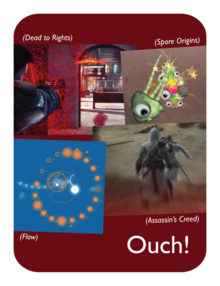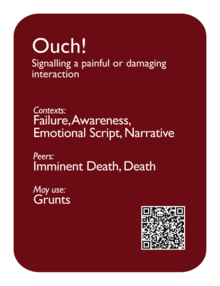Difference between revisions of "Ouch!"
ValterAlves (Talk | contribs) m |
ValterAlves (Talk | contribs) m |
||
| Line 9: | Line 9: | ||
| screenshots= | | screenshots= | ||
| rel-tag1=Contexts:<br> | | rel-tag1=Contexts:<br> | ||
| − | | rel1=[[Failure]], [[Awareness]], [[Emotional Script]]<del> | + | | rel1=[[Failure]], [[Awareness]], [[Emotional Script]]<del> Narrative</del><br> |
| rel-tag2=Peers:<br> | | rel-tag2=Peers:<br> | ||
| rel2=[[Imminent Death]], [[Death]]<br> | | rel2=[[Imminent Death]], [[Death]]<br> | ||
Revision as of 07:57, 13 October 2011

|

| |
| The card's front face | The card's back face |
Contents
Synopsis
| Signalling a painful or damaging interaction. |
Relationships
Contexts:
Failure ![]() , Awareness
, Awareness ![]() , <span id="EmotionalScript
, <span id="EmotionalScriptNarrative-txt" style="">[[Emotional Script Narrative]] <span id="EmotionalScriptNarrative-img" style="">[[File:M385px-EmotionalScriptNarrative-front-v20.png|8px|]]</span></span>.
Peers:
Imminent Death ![]() , Death
, Death ![]() .
.
May use:
Grunts ![]() .
.
Description
Considering that the mechanics of many games demand managing the health of the characters, an effective way to signal interactions that result in damage to their status is to allow themselves to express such events, diegetically.
Sounds associated to Ouch! have an utilitarian role in making the player aware for the consequences of a particular option or circumstance. Yet, their role goes beyond the mere Awareness, potentiating more meaningful interpretations and contributions to the Emotional Script.
are potentially much more contributive
One effective way to present
Examples
  FlOw: A less evident representation of "pain", which is coherent with the Character's Soundprint and with the game's Acoustic Ecology.
|





